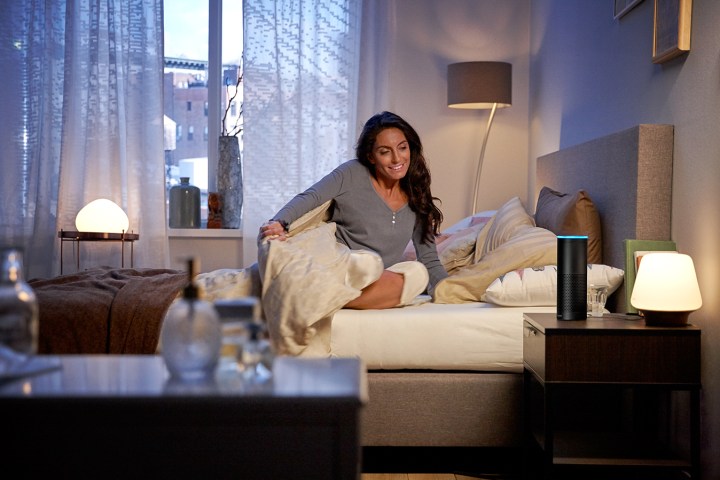
While hardware like Amazon’s Echo and Echo Dot have made it possible for users to play music, find out information, and operate smart gadgets by voice alone, Y Media Labs sees greater potential. It’s been working on Alexa-powered prototypes that could revolutionize the way healthcare works for us, making it more self-sufficient and accessible.
Spotting the potential
Any company can make speculative claims about what the ‘future’ will be. Today, some suggest virtual and augmented reality are about to change the world, while others say it’s going to take a few years.
“My four-year-old doesn’t know how to look at a watch, but he knows how to tell the time because he can ask Alexa what the time is.”
When Y Media Labs thinks it’s cottoned on to a potential game changer, though, it’s worth listening. It rode the wave of mainstream popularity that came with advances in mobile hardware and software, and that’s put it in the right position to leapfrog to the next great innovation in mainstream technological interaction.
“Since I started the company in 2009, we have grown significantly,” explained Y Media Labs CEO Ashish Toshniwal in a chat with DigitalTrends. “I started the company in my dining room, and now we are 230 people. One of the key reasons we have grown is because mobile, iOS and Android. When they launched, people thought it was a fad. But we had faith that there was a huge chance that this may be mainstream and eight years later, it has become mainstream.”
Over the years Y Media Labs has worked with the likes of Facebook, Staples, Paypal, and Home Depot, helping them leverage new technologies to expand their sales practices and functionality for consumers. In each case Y Media was ahead of the curve, which is why even some of the most prolific technology companies hired on its services to help push the envelope of their digital offerings.

Toshniwal believes Y Media is again on the cusp of a new generation of mainstream technological acceptance — with Alexa, and other vocal assistants.
“The way I look at Alexa is that my four-year-old doesn’t know how to look at a watch, but he knows how to tell the time because he can ask [our Echo Dot] what the time is,” Toshniwal said. “Last week I saw him frustrated working with his Lego, and his natural response was to ask
It’s this intuitive, naturalistic interaction that has Toshniwal so excited. If his four-year-old son can use the Echo Dot’s potential at such a tender age, there’s no reason that everyone else can’t.
“If you look at the history, when the internet was born, it was all point and click. You go to a website, you click, you checkout or go to another website. That was mainstream,” he said. “And then iPhone and Android came and they leveraged touch and touch became mainstream, because touch is a very natural human way of experiencing things. Now voice is on the verge of becoming mainstream, because I feel […] you don’t have to understand how it works, you just talk to it.”
Speaking up about health
The fact the old and the young can so easily use Alexa is what has Toshniwal so excited about its potential to improve health care. He believes its adoption, once started, will be swift and complete.
Y Media Labs’ first attempt to use Alexa in a healthcare setting involved patient follow-up after surgery. Poor aftercare is the most common reason people end up back in hospital, Toshniwal said. Patients often become confused about how and when to take medication, or don’t know how to respond to changes in their symptoms. Toshniwal believes
“Let’s say the patient is connected to all of their kit, diabetes, blood pressure, they can weigh themselves every day and it’s all connected to the Alexa system,” he explained. “If the blood pressure goes beyond the certain limit, [they can use]
Toshniwal also thinks Alexa could help with insurance. Many young patients don’t understand how their insurance works, what’s covered, and what tax deductibles they might have because of it. Trends. To fix that, Y Media Labs is developing a conceptual system that would allow users to ask about key information directly through their
“That’s another area where Alexa can help today, where millennials can talk to
If you build, it they will come
The healthcare industry is already listening to what Toshniwal has to say. Though these ideas are still prototypes, hospitals and healthcare companies are already showing interest, and want to help advance healthcare into a new age with vocal assistants.
“You don’t have to understand how it works. You just talk to it.”
“I have been so surprised that there has been no process to it,” Toshniwal laughed. “We saw a use case, we developed the prototype [with Box] and we just shot a video and put it online. And what we saw was that these companies [are excited]. We’re working with massive hospital chains in America [and] different healthcare companies which are more than $10 billion in market cap and they have seen what we have done and asked us, ‘can you help us bring this to fruition?'”
That cooperation with major hospitals is a key part of making Alexa the versatile tool Toshniwal believes it can be. To bring
Patient confidentiality
Privacy is one concern holding back the potential of digital assistants in healthcare. Alexa is effectively an open microphone in a patient’s home. We asked Toshniwal how this problem of trust may be compounded in a setting where deeply personal healthcare information is being discussed with
While he acknowledged that some security measures need to be put in place, he said existing data protection practices in hospitals and healthcare facilities should be enough.

“I feel that’s a matter of time, where Alexa will be able to recognize voice, whether it’s coming from Jon or Ashish or whoever, and accordingly
That’s an optimistic outlook on what is a rather contentious topic. Breaches in healthcare institutions are far from an irregular occurrence, especially if you look at the problem as an international one. Any introduction of new, heavily connected technology will need to be carefully considered to make sure that patient data is protected. Making sure that it’s not funneled through the same channels as consumer-focused Alexa data would be a must.
Although Toshniwal wouldn’t be drawn on specifics about whether Y Media Labs could be involved in developing such protections, it is clearly beavering away behind the scenes on many advances in Alexa technology, and leveraging them in a healthcare environment. Hurdles do remain before
Alexa, watch this space for us.
Updated 12/04/2017 by Jon Martindale – minor spelling correction.
Editors' Recommendations
- Some Ryzen CPUs are burning up. Here’s what you can do to save yours
- This cockroach-inspired rescue bot could save your life one day
- Weather alerts may be the smartest use of smart lights. They can save your life




